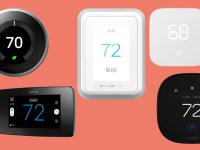Myth vs. fact: Unplugging devices when you leave the house
Is there any safety or economic benefit to unplugging your stuff?
Products are chosen independently by our editors. Purchases made through our links may earn us a commission.
Most everyone I know seems to have an "unplugger" in their family. The mom who unplugs the toaster after the toast is done. The grandpa who unplugs practically everything in the house when he leaves for vacation.
They're concerned about saving money. Or was it preventing a fire? Or both? Possibly they forgot why but they'll fight you to a standstill about its necessity.
Myth: Unplugging your devices saves power and improves safety.
Fact: Safety, maybe. But it won't save much money these days.
As it turns out, there is some validity to their argument, but there have also been recent technological breakthroughs that poke a hole in their defense.
Safety first
The U.S. Consumer Product Safety Commission (CPSC) recommends unplugging electrical devices when not in use, predicated on the rather obvious but nevertheless correct observation that something unplugged can't start fires or shock someone.
But as so many devices have clocks on them that we'd rather not have to reset, not to mention the myriad other reasons we might not want to unplug everything before we leave the house, the CPSC's fallback suggestion is to not mangle the cord or plug it into a faulty outlet.
Sensible advice? Definitely. But I'm still not unplugging my lamps when I leave for work, especially as constantly fiddling with the cords may lead to the very mangling that we're supposed to avoid.
For low-load devices, a power strip with an off switch is a simple alternative, but never use a power strip for high-load appliances (that includes toasters!).
Unplugging saves money? Not so much.
The economic argument for unplugging devices has fallen by the wayside.
In the pre-computer age, devices using standby power — electrical power drawn by a device even when it's "off"— were the exception. The bulk of your energy consumption came from a few large appliances like your hot water heater, fridge and dryer.
Then in the 2000s, standby power started to become the norm. Anything with a clock on it (microwaves, VCRs, ovens, etc.) was only the most visible example of an "energy vampire," but they could be found all over your home, and significant energy was being expended by keeping them plugged it.
Thus began a campaign of public awareness, government regulation and technological advances determined to decrease standby power consumption. By some miracle, it actually worked.
"It's changed dramatically," says Dr. Alan Meier, a scientist at Lawrence Berkeley National Laboratory. "Every product, we've seen dramatic reductions in standby power consumption."
The most important change: a redesign of the humble power supply. The electricity that comes out of a wall outlet is an alternating current (AC) and needs to be converted to direct current (DC) to operate your devices. The power supply — the little brick on your phone charger, for example — converts that energy, and tremendous advances have been made in the past two decades that make that process more efficient on increasingly miniaturized circuitry.
And because so many devices have become computer-controlled, everything from your washer to your toaster oven to your hot water heater is benefiting from the those efficiency gains, sometimes reducing standby power by as much as 90 percent.
So what's the latest advice for the unpluggers in your life? When it comes to vigilantly unplugging smaller devices, like phone chargers, Meier suggests that there are more productive ways to spend your time.
What can you do to save energy now?
Here are a number of suggestions for lowering your home's energy bills that don't require running around plugging and unplugging everything you own:
- Replace all your remaining incandescent light bulbs with LEDs. They use a fraction of the energy and last far longer.
- Don't heat and cool an empty house. A smart thermostat will even let you turn the HVAC off remotely from your phone.
- Enable "sleep mode" on devices that have it. Check the menu settings if you're not sure.
- Replace older appliances with newer, more efficient models. Look for the Energy Star label to ensure maximum efficiency.
- Look for devices you've forgotten about and unplug them. VCRs, for instance, still abound in many households.
- Insulate your water heater, or set it to a lower temperature.
If you have a question about how your stuff works, or just want to know what to buy, email us at [email protected].


